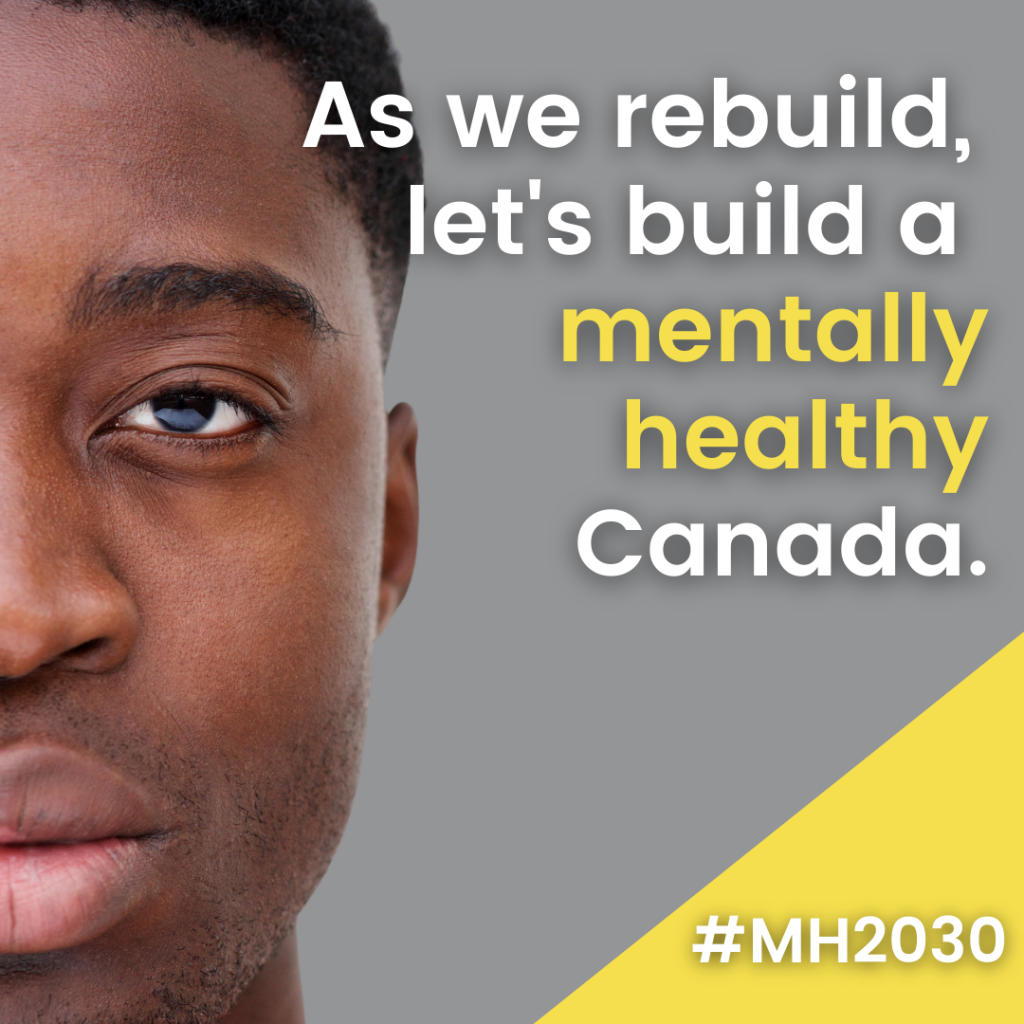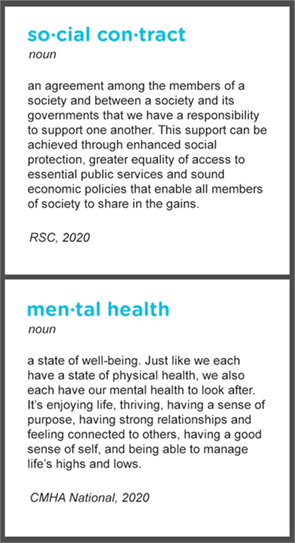Menu
Close

A new “Social Contract” for a Mentally Healthy Canada
Mar 23, 2021
Canada has been suffering through a mental health crisis that has worsened since the onset of the COVID-19 pandemic. Declared a public health emergency in many parts of Canada last year, the COVID-19 pandemic has resulted in an unpredictable and unwieldy health and economic crisis that threatens Canadians’ mental health, and especially the mental health of our most vulnerable people.

Since the pandemic hit, 40% of people in Canada report[1] a decline in their mental health, with certain vulnerable groups even harder hit. Almost two-thirds, or 61% of those with a pre-existing mental health condition and 61% of those who are unemployed tell us their mental health has worsened. Youth (60%) and Indigenous peoples (54%) also cited declines in mental health, and 10% of Canadians reported that they recently experienced thoughts or feelings of suicide, up from 2.5% in 2016.
The issue is complex and far-reaching and that’s why CMHA, along with The Wellesley Institute, Children First, Centre for Addiction and Mental Health (CAMH), United Way, YMCA, and Kids Help Phone are calling for a new kind of solution—we’re calling for a Social Contract for a Mentally Healthy Canada.
A social contract is an agreement, actioned through progressive social policies, that we have a responsibility to care for one another. Our governments are the key institutions through which that responsibility is actioned.[2]
A backwards glance into Canadian history shows us that the concept of a social contract has been an important part of our nation’s story, and in fact that it was times of crisis that catalyzed progressive policy change. Following the Great Depression, a time marked by high unemployment and homelessness, Canada was swept by social policy reforms that introduced unemployment insurance, social housing, and later, Medicare, which are just a few programs and services that make up our social safety net.
When Medicare was established, however, mental health care delivered in community settings was not included in our system of public health insurance. As a result, Canadians with mental illness and mental health care needs have been paying out of pocket, relying on private health insurance or forfeiting mental health care entirely. With COVID-19, lockdowns and job losses have resulted in business closures, high unemployment rates and food insecurity. The pandemic has exposed the gaps that already existed in our social safety net. At the same time, it also presents an opportunity to make Canadian history once again by reforming health and social policy so that Canadians have access to a network of mental health programs and services, including cost-effective, accessible community-based supports.
Building on Canada’s history of progressive social policy, we propose that we need a new Social Contract for a Mentally Health Canada. We must focus on mental wellness and resiliency as well as mental health problems. We must build on existing initiatives and add a public health, whole-of-government, and health promotion approach to support mental health, prevent mental illness and promote recovery. We must recognize that the social determinants of health, such as poverty, race and social inclusion, must be addressed to achieve a fair and resilient future for mental health in Canada.
What could we achieve through a Social Contract for a Mentally Healthy Canada?
We propose working collaboratively across sectors to develop a national 10-year Mental Health Renewal Plan, along with plans for each province, territory and municipality, that align with other health and social strategies.
Our 10-year Mental Health Renewal Plan will include:A mental health care system that is funded to levels adequate to meet the needs of everyone, wherever they live in Canada.
- Every workplace in Canada meeting the Mental Health Commission of Canada’s National Standard for Psychological Health and Safety
- A comprehensive public health approach to substance use policy
- Prioritization of the physical, mental and emotional safety and well-being of our children by all levels of government to reduce adverse childhood experiences and build resilience
- The elimination of chronic homelessness and poverty
In Canada by the year 2030, we will have:
- A 50 per cent reduction in pre-pandemic emotional distress
- A 50 per cent reduction in the number of children exposed to adverse childhood experiences that lead to poorer mental health, and,
- A 50 per cent reduction in the suicide rate in Canada
How will we do it?
- Involve government, civil society groups and business in planning
- Focus on both mental illness and mental health
- Take a health equity approach to mental health and wellness and include the collection of disaggregated data
- Include those with lived experience in all aspects of planning and delivery
- Emphasize resilience across and for all parts of our society, particularly for groups that most need our help
To read more about the Social Contract, please visit https://www.wellesleyinstitute.com/mh2030/.
The Canadian Mental Health Association’s role
CMHA has been calling on the federal government to develop and implement a long-term mental health COVID-19 recovery plan to ensure all Canadians — especially the most vulnerable – can access the care they need. Investing in mental health care and in the social supports that promote Canadians’ wellness, and especially the wellness of the most vulnerable, is a necessary step for ensuring that we do not experience an echo pandemic of mental health problems long after the COVID-19 pandemic has been suppressed. Mitigating an echo pandemic will require access to the full continuum of mental health programs, services and supports, including adequate follow-up and access to wrap-around supports and services, and to multilingual, gender-responsive and culturally safe services.
With proper funding from the government and the right system of community supports in place across the country, we can meet the overwhelming need for care, help Canadians recover, improve outcomes and ultimately save lives.
To read more about CMHA’s federal advocacy and our submission to the government for Budget 2021, please visit this page.
[1] https://cmha.ca/news/despair-and-suicidal-feelings-deepen-as-pandemic-wears-on
[2] McCabe, C., Boadway, R., Lange, F., Gold, E.R., Cotton, C., Adamowicz, W., Breznitz, D., Elgie, S., Forget, E., Jones, E., de Marcellis-Warin, N., Peacock, S., Tedds, L. Renewing the Social Contract: Economic Recovery in Canada from COVID-19. Royal Society of Canada. 2020
